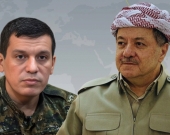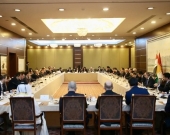Putin’s failure damning Russia to low growth trap

The Russian economy ministry on Thursday dramatically confirmed what was obvious to many, by downgrading its estimate of Russia’s average growth to 2030 to a paltry 2.5 percent, a far cry from over seven percent rates in the early Putin years.
"The pace of Russia's economic growth will fall behind the global average in the forecast period," admitted Economy Minister Alexei Ulyukayev.
This year even Russia's official forecast puts 2013 growth at just 1.8 percent. But most worrying for the Kremlin is that the weakness cannot just be blamed on external factors but stems from domestic shortcomings.
The Russian economy faces a daunting list of troubles –- a declining population, the re-emergence of the United States as a rival energy superpower due to shale gas, and the government's colossal spending on defence that stretches the budget.
These factors are compounded by Russia's failure to stimulate private enterprise, reform the judicial system, improve labour productivity and turn the Russian economy into more than a lumbering energy producer.
Russia's weakness this year alone can be linked to this failure, which has damaged the investment climate, economists say.
The revisions by the economy ministry were the “clearest signal yet that Moscow believes that economic weakness over the past year has been structural rather than cyclical in nature,” said Neil Shearing, Chief Emerging Markets Economist at Capital Economics.
"Without a major shift in policy we suspect that Russia will go from being one of the world’s fastest growing economies to one of its biggest underperformers."
The forecasts by his own ministry made Putin’s aim of Russia becoming one of the world’s top five economies by 2020 look almost laughable and also undermined its credibility as a member of the BRICS groups of supposedly fast-growing emerging markets.
An October survey of 21 top economists by Russia’s Higher School of Economics (HSE) showed not only a low consensus forecast of 1.6-percent growth this year, but also growth expectations of three percent or less for every year up to 2022.
“Three percent growth, which would have seen unjustifiably low until recently now seems almost unreachable,” said Sergei Smirnov, deputy director of the HSE’s Development Institute.
He said that forecasts of "a decade of lean years" would mean growth of 29 percent in the decade from 2013-2022, making a mockery of the government’s ambition to double GDP in 10 years.
Russia's central bank, which has long kept a hawkish eye on inflation, on Friday warned about Russia's growth prospects after keeping key interest rates unchanged at 5.5 percent.
"Due to weak investment activity and the slow recovery of external demand, the Central Bank expects low Russian economic growth rates to remain in the medium-term perspective," it said.
The International Monetary Fund warned Russia in October that unless more was done to address reform, growth in the medium term would be no more than 3.5 percent due to Russia’s weak investment climate.
But it said that Russia could achieve medium-term growth of 5.0 percent with reform. “Under a reform scenario, Russia’s medium-term growth could rise considerably,” it said.
Putin built his popularity on giving many Russians a new prosperity after the torrid 1990s. According to the IMF, this meant that since 2000 Russia has increased its per capita income from 33 to 51 percent of the OECD average.
But Russia was helped in the period up to the 2008-2009 global financial crisis by two one-off factors –- unusually high oil prices and the using up of the spare capacity created by the dismantling of the inefficient Soviet economy.
But this capacity has now been used up, with no slack.
The IMF forecasts growth of just 1.5 percent in 2013 with a pick-up to three percent in 2014. Troublingly for the Kremlin, the IMF says the economy is working at close to full capacity with inflation and employment high.
"The activation of spare capacity and rising oil prices that drove a decade of average annual growth in excess of five percent are not replicable," the IMF said in a report.
With Putin set to stay in the Kremlin until at least 2018 –- and maybe even 2024 if he seeks another mandate –- the Russian authorities will want to ensure a maximum of economic stability to prevent handing a new cause to the still-nascent protest movement.
AFP












